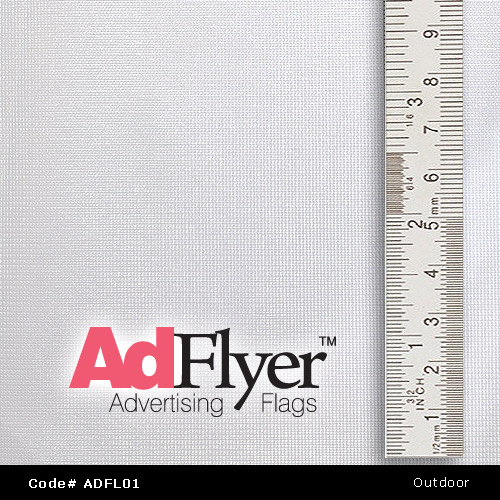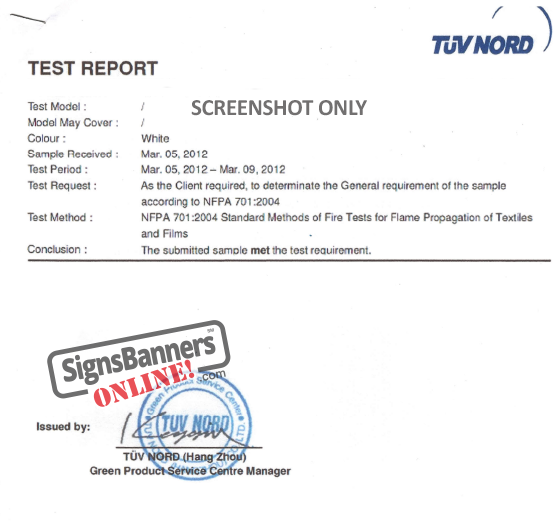| 100% Polyester | |
|---|---|
| Max Print Width: | 21" 155cm - Join for larger |
| Finish: | Biaxial. Aerated tiny holes. Breathable. Insoluble. |
| Weight: | 155 gsm / 5 oz (Fly Grade) |
| Flamability: | Flame Retardant Din-4012-B1 USA NFPA 701 |
| Durability: | Outdoor. 6-12 mth 8metre level excluding flyend. For maximum life: Light-Moderate Winds. |
| Recycle: | 100% Recycle. |
< See Product Page
Note: ADFL01 is exclusive to S B O.
Page Link | See How others are using this product here.
Branded corporate flags.
BULK PURCHASE: This product is best purchased in quantities offseting set up and cost.

Features
- Brighter colors
- Stronger-Tear resistant
- Full Graphic capability
- Photographic imagery
- 16 million colors
- Impressive 75% color 'Showthrough'
ADFL01 is a strong fabric polyester continuous filament yarn, knitted into tubular fabric form or in cut lengths and is well suited to branded corporate flags and banners. Non tear pattern. Breathable holes, woven, good surface area for print definition. (Excellent printing outcomes vs cloth). Suited purpose to flying corporate flags and displays.
Double stitched seams and edges help protect your flag and it's 'fly-end' from fraying however fraying or destruction is not warranted in any manner. Flags due to their exposure to damaging forces are not covered by warranty. AdFlyer flags are famous for quality HOWEVER no warranty is supplied. Light-Moderate Winds.
The U.S. Government generally expects a flag to last approximately 90 days based on daily usage from sunrise to sunset - but not during periods of inclement weather. Tests have shown that in some cases a flag flown 24 hours a day will last only one-fourth as long as one flown during daylight hours only. Flags are not structures and should be replaced. AdFlyer flags do not exceed that expectation.
Storage Handling Transport
No special handling requirements. Wear PPE. No special storage requirements. Transport: US DOT Hazard Class: Not regulated. IATA/IMDG/RID/ADR/UN(not regulated/not classified). WHMIS (Canada) Not a controlled product: Foreign Inventory Status: AU(ACIS) CA(DSL) China(IECSC) PI(PICCS) EU(EINECS/ELINCS/NLPL) JP(ENCS) KR(KECI) NZ. Polyester fiber is not classified as a hazardous substance.
Health Hazards
Skin-Eyes: May cause mechanical irritation. Exposure Guidelines: Protect against hazards such as contact with high speed yarn. Eyewear: Safety glasses during processing. Inhalation: Not respirable in this form. Respiratory: An approved dust respirator should be worn. Ventilation: Thermal processing requires ventialtion of fumes and vapors which may cause irritation to the nose and throat. Ingestion: Not a probable route of exposure.
Properties
Ingredient Name: Polyethylen terephthalate. CAS Number 25038-59-9. Weight% >98. Produced acc. to EN ISO No Heavy metals, PVC resins, phthalates of fungicides. Recyclable. No carcinogen properties listed. Appearance: Off-white solid or delustered fiber or clear to greenish resin. Physical State: Solid. Odor: Ink after printing. Solubility In Water: Insoluble. Incompatabilities: Normally Stable, Tends to dissolve in caustic materials.
Hazards
Hazardous Decomposition Products: Thermal decomposition products may include CO, ethylene glycol, aldehydes and other C, H, and O compounds varying in chemical structure and molecular wieghts. Hazardous Polymerization: Will not occur. Toxicological Information: Not considered to cause irritant or allergic contact dematitis. Delayed: None shown. Disposal Considerations: RCRA: No. Other Disposal Considerations: Dispose as nonhazardous waste in accordance your regulations. Toxic Substance Control Act (TSCA): Polymer is listed on the TSCA Inventory.
Declaration of the preparation:
- The preparation isn't classified as dangerous and it contains no hazardous material.
- Manufactured to meet NFPA-701 Small Scale
Hazards Identification: None reported or known to exist. FIRST AID MEASURE [Acute-Chronic None listed] Ingestion: Seek immediate medical assistance.
FIRE: Flame Retardant Din-4012-B1 USA NFPA 701. Draperies used in public spaces. Test Method: DIN4102-1: Name of Product: FLAG FABRIC(suitable test) Conclusion: When tested as specified, the test results of the submitted samples not exceed the requirement of DIN4102.

Fire Fighting FLASH POINT: >510°C. Flammable Limits In Air: NA. Fire Fighting Media: Standard Agents, Dry Chemical Foam, CO2, Water, Spray (fog). Fire Fighting Equipment: Wear full bunker including self contain breathing apparatus to avoid exposure to smoke and vapors. Unusual Fire And Explosion Hazards: NA. Physical & Chemical Properties: Melting point 250°C. Decomposition Temperature: >350°C. Conditions To Avoid: Temperatures above 350°C will cause decompositions in the presence of oxygen. Solubility In Water: Neglible. Chemical Stability: Stable. Incompatability: Incompatible or can react with strong oxidizers, bases and acids.
Polyester Fibers are coated with minor quantities of finish oils. Textile processes may volatilize portions of these finishes and produce visible misting in the workplace. Ventilation is recommended to minimize exposure to such finish mists which should not exceed a concentration of 5 mg/m3 ACGIH TLV for mineral oil.
Polyester Fibres are/maybe coated with ink. Textile printing processes may volatilize portions of these finishes. The inkjet ink prepartion isn't classified as dangerous and it contains no hazardous material after curing during normal handling and operation. At tempertures between approximately 130-190°C the applied finish may evaporate or decompose. Residual solvents post 128 hours: 0.05%.
The information in this Material Data Sheet page relates only to the specific material designated and may not apply where such material is used in combination with any other material or in any process. This information is to the best of our knowledge based on accurate and reliable information, but may be subject to revision as new information becomes available. However, no representation, warranty or guarantee is made as to its accuracy, reliability or completeness. Each user is responsible for satisfying itself as to the suitability of such information for its own particular use; therefore additional safety precautions may be required. E&EO.